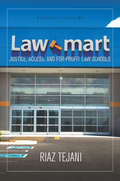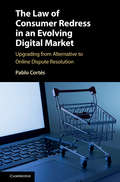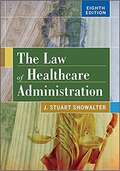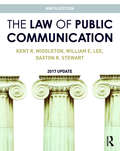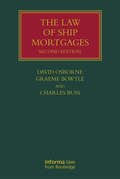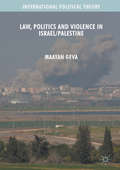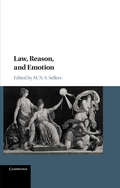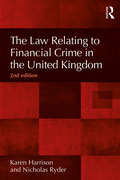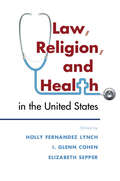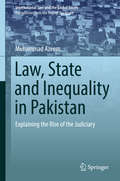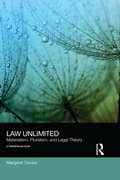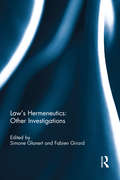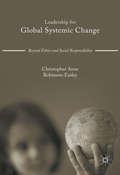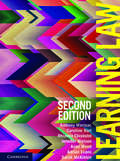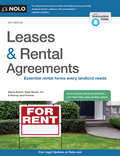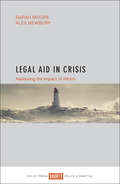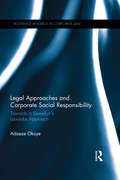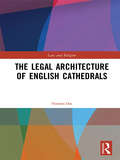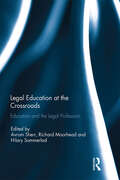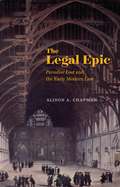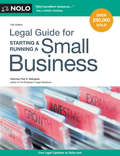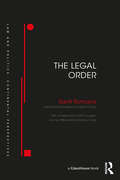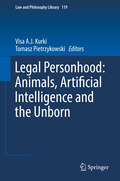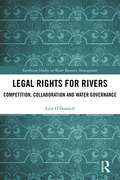- Table View
- List View
Law Mart: Justice, Access, and For-Profit Law Schools
by Riaz TejaniAmerican law schools are in deep crisis. Enrollment is down, student loan debt is up, and the profession's supply of high-paying jobs is shrinking. Meanwhile, thousands of graduates remain underemployed while the legal needs of low-income communities go substantially unmet. Many blame overregulation and seek a "free" market to solve the problem, but this has already been tested. Seizing on a deregulatory policy shift at the American Bar Association, private equity financiers established the first for-profit law schools in the early 2000s with the stated mission to increase access to justice by "serving the underserved". Pursuing this mission at a feverish rate of growth, they offered the promise of professional upward mobility through high-tech, simplified teaching and learning. In Law Mart, a vivid ethnography of one such environment, Riaz Tejani argues that the rise of for-profit law schools shows the limits of a market-based solution to American access to justice. Building on theories in law, political economy, and moral anthropology, Tejani reveals how for-profit law schools marketed themselves directly to ethnoracial and socioeconomic "minority" communities, relaxed admission standards, increased diversity, shook up established curricula, and saw student success rates plummet. They contributed to a dramatic rise in U.S. law student debt burdens while charging premium tuition financed up-front through federal loans over time. If economic theories have so influenced legal scholarship, what happens when they come to shape law school transactions, governance, and oversight? For students promised professional citizenship by these institutions, is there a need for protections that better uphold institutional quality and sustainability? Offering an unprecedented glimpse of this landscape, Law Mart is a colorful foray into these essential questions.
The Law of Consumer Redress in an Evolving Digital Market: Upgrading from Alternative to Online Dispute Resolution
by Pablo CortésThis book advances the emerging of a new sub-field of study, the law of consumer redress, which encompasses the various dispute resolution processes for consumers, their regulations, and best practices. The book argues that the institutionalisation of alternative dispute resolution (ADR) bodies are expanding their functions beyond dispute resolution, as they are increasingly providing a public service for consumers that complements, and often replaces, the role of the courts. Although the book focuses on ADR, it also analyses other redress methods, including public enforcement, court adjudication and business internal complaints systems. It proposes a more efficient rationalisation of certified redress bodies, which should be better co-ordinated and accessible through technological means. Accordingly, the book calls for greater integration amongst redress methods and offers recommendations to improve their process design to ensure that, inter alia, traders are encouraged to participate in redress schemes, settle early meritorious claims and comply with outcomes. Incorporates recent legal developments in the field of consumer redress keeping abreast with fundamental legal changes. Examines different consumer redress models, and European as well as various national dispute resolution schemes. Discusses how technology is being imbedded into the dispute resolution process looking at the intersection of technology and dispute resolution.
The Law of Healthcare Administration
by J. Stuart ShowalterThe Law of Healthcare Administration offers a thorough examination of health law in the United States from a management perspective. Using plain language accessible to nonlawyers, the book moves from broad-brush treatments of the US legal system and the history of medicine to specific issues that affect healthcare leaders daily, including contracts, torts, taxation, antitrust laws, regulatory compliance, and, most pressing, health insurance reform and the important changes that have taken place since the Affordable Care Act (ACA) became law in 2010. <p><p> The legal concepts discussed in the book are amply supported by real-life examples, detailed explanations, and excerpts from decisions of federal and state courts.
The Law of Public Communication: 2017 Update
by William E. Lee Daxton Stewart Kent R. MiddletonThe Law of Public Communication provides an overview of media law that includes the most current legal developments today. It explains the laws affecting the daily work of writers, broadcasters, advertisers, cable operators, Internet service providers, public relations practitioners, photographers, bloggers, and other public communicators. Authors Kent R. Middleton, William E. Lee, and Daxton R. Stewart take students through the basic legal principles and methods of analysis that allow students to study and keep abreast of the rapidly changing field of public communication. By providing statutes and cases in a cohesive manner that is understandable, even to students studying law for the first time, the authors ensure that students will acquire a firm grasp of the legal issues affecting the media. This 2017 Update brings the Ninth Edition up to date with the most recent cases and examples affecting media professionals and public communicators.
The Law of Ship Mortgages (Lloyd's Shipping Law Library)
by David Osborne Graeme Bowtle Charles BussThought to be the most comprehensive guide to English law relating to ship mortgages, the second edition of The Law of Ship Mortgages has been highly anticipated. This fully-updated and complete explanation provides practitioners with a practical, commercially-based, and definitive guide to the English law of ship mortgages as well as important related areas such as conflict of laws and insolvency. The authors, being seasoned practitioners themselves, bring their practical experience to bear on a number of difficult and developing areas of the law, such as: mortgagees’ duties, liability to charterers, conflicts of laws, work-outs and cross border insolvency. New to this edition: In-depth analysis of noteworthy cases such as The WD Fairway litigation, PK Airfinance v Alpstream, and Tropical Reefer and Anton Durbeck v DNB Enhanced coverage of issues such as security interests in ships, priority, and third party involvement Completely revised and reordered content, to better reflect practitioner needs Written with practitioners in mind, this new edition will be extremely useful to legal professionals working in any jurisdiction that is involved in international ship finance, as well as post-graduate students and academics.
Law, Politics and Violence in Israel/Palestine
by Maayan GevaThis book investigates the Israeli engagement with international law in relation to the Occupied Palestinian Territories (OPT) between 1967 and 2009. Grounded in a field-based study of the military International Law Department, it examines the dynamic position and impact that international law has had in the OPT. By analysing the Israeli 2008/9 offensive in Gaza as an example of contemporary warfare, the author argues that law and military agenda have become intertwined in 'lawfare', a condition sanctioning new forms of law and violence. The military legal system is central to the Israeli management of the OPT, yet despite the great interest in the legal aspects of the Israeli occupation, scholarly accounts of this institution are scarce. This discussion also has wider international relevance, particularly in the backdrop of the contemporary prominence of international law in Western militaries' operations. This book will appeal to researchers, practitioners and students interested in international relations, political theory, human rights, Middle Eastern politics, and legal studies.
Law, Reason, and Emotion
by M. N. S. SellersThis book examines the role and importance of reason and emotion in justice and the law. Eight lawyers and philosophers of law consider law's basis in the universal human need for society, our innate sense of justice, and many other powerful inclinations and emotions, including the desire for fairness and even for law itself. Human beings are deeply social creatures, inspired by social and other emotions, which can ennoble, support, or undermine the law. Law gains legitimacy and effectiveness when reason recognizes and embraces human emotions for the benefit of society as a whole. This volume explores the power and purposes of reason and emotion in the law. Explores the relationships between law and reason, emotion and the law, and reason and emotion. Argues that reason and human emotion are not conflicting values in a well-constructed legal system, but rather the joint basis of justice in the law. Simplifies legal vocabulary through accessible definitions of the most common terms used when discussing reason, emotion and justice in the law.
The Law Relating to Financial Crime in the United Kingdom (The Law of Financial Crime)
by Karen Harrison Nicholas RyderOutlining the different types of financial crime and their impact, this book is a user-friendly, up-to-date guide to the regulatory processes, systems and legislation which exist in the UK. Each chapter has a similar structure and covers individual financial crimes including money laundering, terrorist financing, fraud, insider dealing, market abuse, bribery and corruption and finally tax avoidance and evasion. Offences are summarized and their extent is evaluated using national and international documents. Detailed assessments of financial institutions and regulatory bodies are made and the achievements of these institutions are analysed. Sentencing and policy options for different financial crimes are included and suggestions are made as to how criminal proceeds might be recovered. This second edition has been fully updated and includes a section on cybercrime and a new chapter on tax evasion. Case summaries have also been included in those chapters where a criminal justice route is used by the prosecuting authorities.
Law, Religion, and Health in the United States
by Cohen Lynch Holly Fernandez I. Glenn Elizabeth SepperWhile the law can create conflict between religion and health, it can also facilitate religious accommodation and protection of conscience. Finding this balance is critical to addressing the most pressing questions at the intersection of law, religion, and health in the United States: should physicians be required to disclose their religious beliefs to patients? How should we think about institutional conscience in the health care setting? How should health care providers deal with families with religious objections to withdrawing treatment? In this timely book, experts from a variety of perspectives and disciplines offer insight on these and other pressing questions, describing what the public discourse gets right and wrong, how policymakers might respond, and what potential conflicts may arise in the future. It should be read by academics, policymakers, and anyone else - patient or physician, secular or devout - interested in how US law interacts with health care and religion.
Law, State and Inequality in Pakistan
by Muhammad AzeemThrough a detailed historical and empirical account of post-independence years, this book offers a new assessment of the role of the judiciary in Pakistani politics. Instead of seeing the judiciary as helpless or struggling against an authoritarian state, it argues that the judiciary has been a crucial link in the creation of state and political inequality in Pakistan. This rubs against the central role given to the judiciary in developing countries to fix the 'corrupt politicians and stubborn bureaucracies' in the World Bank's 'Good Governance' paradigm and rule of law initiatives. It also challenges the contemporary legal and judicial discourse that extols the virtues of Public Interest Litigation. While the book's core analysis is a critique of the contemporary liberal legal project, it also adds to the critical tradition of social theory by linking political economy to a social theory of law. The theoretical aspect of the study is applicable to any developing society whose judiciary is going through foreign-sponsored 'rule of law' judicial reforms.
Law Unlimited (Social Justice)
by Margaret DaviesThis book engages with a traditional yet persistent question of legal theory – what is law? However, instead of attempting to define and limit law, the aim of the book is to unlimit law, to take the idea of law beyond its conventionally accepted boundaries into the material and plural domains of an interconnected human and nonhuman world. Against the backdrop of analytical jurisprudence, the book draws theoretical connections and continuities between different experiences, spheres, and modalities of law. Taking up the many forms of critical and socio-legal thought, it presents a broad challenge to legal essentialism and abstraction, as well as an important contribution to more general normative theory. Reading, crystallising, and extending themes that have emerged in legal thought over the past century, this book is the culmination of the author’s 25 years of engagement with legal theory. Its bold attempt to forge a thoroughly contemporary approach to law will be of enormous value to those with interests in legal and socio-legal theory.
Law's Hermeneutics: Other Investigations
by Simone Glanert Fabien GirardBringing together leading academics hailing from different cultural and scholarly horizons, this book revisits legal hermeneutics by making particular reference to philosophy, sociology and linguistics. On the assumption that theory has much to teach law, that theory motivates and enables, the writings of such intellectuals as Martin Heidegger, Hans-Georg Gadamer, Jacques Derrida, Paul Ricœur, Giorgio Agamben, Jürgen Habermas, Ronald Dworkin and Ludwig Wittgenstein receive special consideration. As it explores the matter of reading the law and as it inquires into the emergence of meaning within the dynamic between reader and text against the background of the reader’s worldly finiteness, this collection of essays wishes to contribute to an improved appreciation of the merits and limits of law’s hermeneutics which, it argues, is emphatically not to be reduced to a simple tool for textual exegesis.
Leadership for Global Systemic Change
by Christopher Anne Robinson-easleyThis book argues that organizations, corporations, and governments have the abilities and resources to drive deep systemic change, yet fail to evoke change strategies that can significantly improve the social fabric of our global environment. It actively engages the reader in a conversation that reviews, evaluates, and challenges these issues juxtaposed to current strategies and resulting positions regarding business ethics, social responsibility, our view towards humanity, and the role of leaders. Provocative in its voice and message, this book demonstrates how more robust contributions can lead to effective change. The author includes a detailed change model designed to invoke significant global change that builds upon the current work of the United Nations' Global Compact, and incorporates the participation of all critical stakeholders including corporate leaders, civil society, government leaders, and the people who are challenged daily by ethical dilemmas and social responsibility initiatives. It speaks to academics and students of change management, social responsibility, and business ethics, as well as the organizations and communities who stand to make a positive difference in the world.
Leadership for Global Systemic Change: Beyond Ethics and Social Responsibility
by Christopher Anne Robinson-EasleyThis book argues that organizations, corporations, and governments have the abilities and resources to drive deep systemic change, yet fail to evoke change strategies that can significantly improve the social fabric of our global environment. It actively engages the reader in a conversation that reviews, evaluates, and challenges these issues juxtaposed to current strategies and resulting positions regarding business ethics, social responsibility, our view towards humanity, and the role of leaders.Provocative in its voice and message, this book demonstrates how more robust contributions can lead to effective change. The author includes a detailed change model designed to invoke significant global change that builds upon the current work of the United Nations’ Global Compact, and incorporates the participation of all critical stakeholders including corporate leaders, civil society, government leaders, and the people who are challenged daily by ethical dilemmas and social responsibility initiatives. It speaks to academics and students of change management, social responsibility, and business ethics, as well as the organizations and communities who stand to make a positive difference in the world.
Learning Law
by Anthony Marinac Caroline Hart Rhianna Chisholm Jennifer Nielsen Asmi Wood Adrian Evans Sarah McKibbinLearning Law is an accessible and engaging introduction to Australian law for students considering a career in the legal profession. This text teaches students how to deal with legislation and cases, focusing on core topics and contextualisation. This second edition has been thoroughly updated and revised, with significant changes including: six new chapters – First Peoples and the law, research, the ethical lawyer, statutory interpretation, lawyers and clients, becoming a lawyer – more coverage of parliaments and courts, new Living Law boxes that showcase the diverse career paths available to law graduates and new Critical Perspective boxes to engage students with critical analysis. Written in a conversational style, Learning Law will leave students feeling more knowledgeable about, and confident in, their interactions with Australian legal institutions and legal professionals. This text is an essential resource that law students will refer to throughout their studies and in the early stages of their career.
Leases & Rental Agreements
by Marcia Stewart Janet PortmanEssential rental forms every landlord needs Looking for a quick way to create the key documents necessary for owning or managing rental property, including a legally valid lease or rental agreement? Leases & Rental Agreements provides the practical and legal information necessary you need. With this bestselling guide, you'll learn how to: prepare a rental agreement or lease tailor your documents to meet your needs make required disclosures to tenants comply with your state's laws on security deposits, privacy rules, discrimination, and more check tenant references and credit, and do a final inspection when a tenant moves out. The 12th edition provides updated 50-state information on security deposits, rent rules, access to rental property and more. All forms are downloadable from the Nolo website.
Legal Aid in Crisis: Assessing the Impact of Reform
by Sarah Moore Alex NewburyOriginally introduced as a form of social welfare with near-universal eligibility, legal aid in the UK is now framed as a benefit external to the legal system and understood in primarily economic terms. This book is the first to evaluate the recent reforms of UK legal aid from a social policy perspective and assess their impact on family law courts and advocacy. Written by experts in the field, it focuses on the rise in people representing their own legal case and argues that the reforms effectively ‘delawyerise’ disputes, producing a more inquisitorial justice system and impacting the litigants, court system, staff and process. Arguing for a more holistic concept of the reforms, the book will be of relevance to students, academics, policy-makers, judges, campaigners and social workers, not just in England and Wales, but in other jurisdictions instituting cuts to their legal aid budgets, such as Australia, Scotland, France, and the Netherlands.
Legal Approaches and Corporate Social Responsibility: Towards a Llewellyn’s Law-Jobs Approach (Routledge Research in Corporate Law)
by Adaeze OkoyeFrom the late 20th Century, a catalogue of high profile disasters and controversies has drawn attention to the changing relationship between corporations and society. This is taking place against the context of globalisation and this change has become the driving force for demands that corporations become socially responsible. Corporate social responsibility (CSR) has therefore emerged as a concept which attempts to encapsulate these demands for social responsibility. Yet at the heart of CSR is the debate about the role and relevance of law. This book will explore the proposition that CSR is a valid legal enquiry and will suggest a law-jobs approach which offers a potential general analytical perspective for examining such fluid concepts such as CSR in law. This approach is innovative because of the insistence of some users of CSR on placing law outside the parameters of CSR or giving it a very limited role; however, Okoye argues here that the very nature of CSR as seeking legitimacy for corporate power pushes to the fore the question of what role law can play. Law is an essential and important aspect of legitimacy and thus this work explores a legal theoretical approach that holds potential for a legal framework of CSR. This interdisciplinary book will be of great interest to students and scholars of corporate law and business studies in general.
The Legal Architecture of English Cathedrals (Law and Religion)
by Norman DoeThis original book is a comprehensive, richly documented and critical examination of laws applicable to Anglican cathedrals in England, some of the most iconic monuments in the national heritage and centres of spiritual and cultural capital. Law is the missing link in the emerging field of cathedral studies. The book fills this gap. It explores historical antecedents of modern cathedral law, traces aspects of them that still endure, and explains the law with particular reference to the recommendations of the Archbishops’ Commission on Cathedrals 1994 which led to the most radical changes in the legal history of these churches since the Reformation, culminating in the Cathedrals Measure 1999 and associated later legislation. The book compares the domestic constitutions and statutes of all the cathedrals of the Church of England today – old foundations, new foundations and parish church cathedrals - as well as policies and guidelines applicable to or adopted by them. Whilst national law acts as a fundamental unifying force, there is considerable diversity as between these in terms of the breadth and depth of their coverage of topics. In the socio-legal tradition, the book also explores through interviews with clergy and others, at half of the cathedrals, how laws are experienced in practice. These reveal that whilst much of the law is perceived as working well, there are equally key areas of concern. To this end, the book proposes areas for further research and debate with a view to possible reform. Taking an architectural feature of cathedrals as the starting point for each chapter, from cathedral governance through mission, ministry, music and education to cathedral property, what emerges is that law and architecture have a symbiotic relationship so that a cathedral is itself a form of juristecture.
Legal Education at the Crossroads: Education and the Legal Profession
by Avrom Sherr Richard Moorhead Hilary SommerladFor several years legal professions across the world have, to varying degrees, been undergoing dramatic changes as a result of a range of forces such as globalization, diversification and changes in regulation. In many jurisdictions the extent of these transformations have led to a process of professional fragmentation and generated uncertainty at institutional, organisational and individual levels about the nature and future of legal professionalism. As a result legal education is in flux in many of jurisdictions including the United States, the UK and Australia, with further effects in other Common Law and some Civil law countries. The situation in the UK exemplifies the sense of uncertainty and crisis, with a growing number of pathways into law; an increasing surplus of law graduates to graduate entry positions and most recently proposals for reform of legal education and training by the Solicitors Regulation Authority (SRA). This collection addresses both current and historical approaches showing that some problems which appear to be modern are endemic, that there are still some important prospects for change and that policy issues may be more important than the interests of lawyers and educators. This makes this volume a source of interest to lawyers, law students, academic and policy makers as well as the discerning public. This book was previously published as a special issue of the International Journal of the Legal Profession.
The Legal Epic: "Paradise Lost" and the Early Modern Law
by Alison A. ChapmanThe seventeenth century saw some of the most important jurisprudential changes in England’s history, yet the period has been largely overlooked in the rich field of literature and law. Helping to fill this gap, The Legal Epic is the first book to situate the great poet and polemicist John Milton at the center of late seventeenth-century legal history. Alison A. Chapman argues that Milton’s Paradise Lost sits at the apex of the early modern period’s long fascination with law and judicial processes. Milton’s world saw law and religion as linked disciplines and thought therefore that in different ways, both law and religion should reflect the will of God. Throughout Paradise Lost, Milton invites his readers to judge actions using not only reason and conscience but also core principles of early modern jurisprudence. Law thus informs Milton’s attempt to “justify the ways of God to men” and points readers toward the types of legal justice that should prevail on earth. Adding to the growing interest in the cultural history of law, The Legal Epic shows that England’s preeminent epic poem is also a sustained reflection on the role law plays in human society.
Legal Guide for Starting & Running a Small Business
by Fred S. SteingoldThe all-in-one business law book! When you run a small business, legal questions crop up almost on a daily basis. Ignoring them can threaten your enterprise—but hiring a lawyer to help with routine issues can devastate the bottom line. Fortunately, you have a better alternative. Legal Guide for Starting & Running a Small Business clearly explains how to: raise start-up money pick the right business structure get licenses and permits negotiate a favorable lease protect yourself with the right insurance create binding contracts hire, fire, and manage employees cope with financial problems protect your personal assets, and save on business taxes. The 15th edition is completely updated with the latest business tax rules and numbers, including options for members of husband and wife LLCs, rules for depreciating and expensing business assets, and best practices for classifying workers (as employee or independent contractor).
The Legal Order (Law and Politics)
by Santi RomanoFirst published in 1917 (Part 1) and 1918 (Part 2), with a second edition in 1946, this is the first English translation of Santi Romano’s classic work, L’ordinamento giuridico (The Legal Order). <P><P>The main focus of The Legal Order is the notion of institution, which Romano considers to be both the core and distinguishing feature of law. After criticising accounts of the nature of law centred on notions of rule, coercion or authority, he offers a compelling conception, not merely of law as an institution, but of the institution as ‘the first, original and essential manifestation of law’. Romano advances a definition of a legal institution as any group who share rules within a bounded context: for example, a family, a firm, a factory, a prison, an association, a church, an illegal organisation, a state, the community of states, and so on. Therefore, this understanding of legal institutionalism at the same time provides a ground-breaking theory of legal pluralism whereby ‘there are as many legal orders as institutions’. <P><P>The acme of a jurisprudential current long overlooked in the Anglophone environment (Romano’s work is highly regarded in France, Germany, Spain and South America, as well as in Italy), The Legal Order not only proposes what Carl Schmitt described as a ‘very significant theory’. More importantly, it offers precious insights for a thorough rethinking of the relationship between law and society in today’s world.
Legal Personhood: Animals, Artificial Intelligence and the Unborn
by Visa A.J. Kurki Tomasz PietrzykowskiThis edited work collates novel contributions on contemporary topics that are related to human rights. The essays address analytic-descriptive questions, such as what legal personality actually means, and normative questions, such as who or what should be recognised as a legal person. As is well-known among jurists, the law has a special conception of personhood: corporations are persons, whereas slaves have traditionally been considered property rather than persons. This odd state of affairs has not garnered the interest of legal theorists for a while and the theory of legal personhood has been a relatively peripheral topic in jurisprudence for at least 50 years. As readers will see, there have recently been many developments and debates that justify a theoretical investigation of this topic. Animal rights activists have been demanding that some animals be recognized as legal persons. The field of robotics has prompted questions about driverless cars: should they be granted a limited legal personality, so that the car itself would be responsible for damages? This book explores such concepts and touches on matters of bioethics, animal law and medical law. It includes matters of legal history and appeals to both legal scholars and philosophers, especially those with an interest in theories of law and the philosophy of law.
Legal Rights for Rivers: Competition, Collaboration and Water Governance (Earthscan Studies in Water Resource Management)
by Erin O'DonnellIn 2017 four rivers in Aotearoa New Zealand, India, and Colombia were given the status of legal persons, and there was a recent attempt to extend these rights to the Colorado River in the USA. Understanding the implications of creating legal rights for rivers is an urgent challenge for both water resource management and environmental law. Giving rivers legal rights means the law can see rivers as legal persons, thus creating new legal rights which can then be enforced. When rivers are legally people, does that encourage collaboration and partnership between humans and rivers, or establish rivers as another competitor for scarce resources? To assess what it means to give rivers legal rights and legal personality, this book examines the form and function of environmental water managers (EWMs). These organisations have legal personality, and have been active in water resource management for over two decades. EWMs operate by acquiring water rights from irrigators in rivers where there is insufficient water to maintain ecological health. EWMs can compete with farmers for access to water, but they can also strengthen collaboration between traditionally divergent users of the aquatic environment, such as environmentalists, recreational fishers, hunters, farmers, and hydropower. This book explores how EWMs use the opportunities created by giving nature legal rights, such as the ability to participate in markets, enter contracts, hold property, and enforce those rights in court. However, examination of the EWMs unearths a crucial and unexpected paradox: giving legal rights to nature may increase its legal power, but in doing so it can weaken community support for protecting the environment in the first place. The book develops a new conceptual framework to identify the multiple constructions of the environment in law, and how these constructions can interact to generate these unexpected outcomes. It explores EWMs in the USA and Australia as examples, and assesses the implications of creating legal rights for rivers for water governance. Lessons from the EWMs, as well as early lessons from the new ‘river persons,’ show how to use the law to improve river protection and how to begin to mitigate the problems of the paradox.
